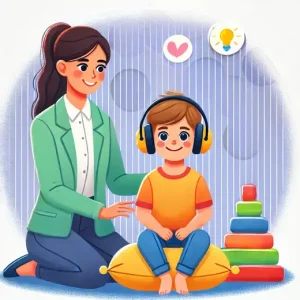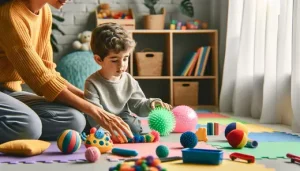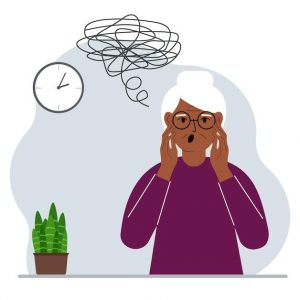Navigating Daily Challenges: Understanding ADHD in Adults
Last Updated: May 14, 2024
Attention Deficit Hyperactivity Disorder, commonly known as ADHD, is often mistakenly regarded as a condition that only affects children. However, the reality is quite different. ADHD can continue to present significant challenges into adulthood, affecting daily life, relationships, and careers. It’s a widespread misconception that ADHD symptoms magically disappear with age. Instead, they evolve, manifesting differently and sometimes more subtly in adults.
Understanding ADHD in its adult form is not just about acknowledging its existence; it’s about actively managing it to enhance one’s quality of life. Effective management can lead to improved relationships, better job performance, and a more organized lifestyle. Thus, exploring the daily challenges faced by adults with ADHD is crucial for anyone looking to navigate these waters smoothly.
Understanding ADHD in Adults
While many of us are familiar with the hyperactive little boy who can’t sit still, ADHD is not a condition confined to childhood. Approximately 4% to 5% of adults globally are estimated to live with ADHD, yet less than 20% of these individuals seek help or receive appropriate treatment. This gap in care is often due to enduring myths, such as the belief that one can simply “outgrow” ADHD. In reality, while the hyperactivity component may decrease with age, other symptoms like inattention and impulsivity can persist and significantly disrupt adult life.
Also Read: ADHD and Autism: Similarities and Differences
Common Symptoms in Adults
ADHD in adults manifests in ways that can be complex and diverse, impacting every aspect of life from work to personal relationships:
- Inattention: This isn’t just about having trouble paying attention. It might mean difficulty following detailed instructions, a tendency to make careless mistakes at work, or challenges in organizing tasks and activities. Adults with ADHD often struggle with executive functions required to plan, organize, and prioritize, which can lead to feelings of being overwhelmed or behind schedule.
- Hyperactivity: While children with ADHD may literally bounce off the walls, adult hyperactivity tends to be more subtle. It might appear as restlessness, an inability to relax, or excessive talking in social situations. Adults might engage in a constant activity, often moving from one task to another without completion.
- Impulsivity: Impulsivity in adults can manifest as poor decision-making, interruptions during conversations, impatience in waiting in line, or even impulsive spending or job changes. This symptom, in particular, can lead to significant problems in interpersonal relationships and financial instability.
Understanding these symptoms and recognizing their impact on daily life is the first step toward effective management. It’s not just about mitigating the negatives but also about leveraging the strengths and creativity often found abundantly in individuals with ADHD.
Common Challenges Adults with ADHD Face
Living with ADHD as an adult comes with a unique set of challenges that can impact every aspect of daily life—from professional aspirations to personal relationships. Let’s explore some of the most common hurdles and discover practical strategies that can help in managing them effectively.
Staying Focused
One of the hallmark struggles for adults with ADHD is maintaining focus, especially in work environments. Distractions can come in various forms, whether it’s background noise or a cluttered workspace, making it tough to concentrate on the tasks at hand.
Improving Focus: Consider creating a distraction-free zone. This could involve using noise-cancelling headphones, organizing your work area, and breaking tasks into smaller, manageable parts. Tools like digital timers or apps that limit time on social media can also help keep you on track.
Time Management
Punctuality and time management are often challenging for those with ADHD. The perception of time can be distorted, and as a result, it’s easy to underestimate how long tasks will take.
Enhancing Time Management: Start by using calendars for everything and set alarms not just for meetings but for starting and ending various tasks throughout the day. Prioritize tasks using the ‘must do,’ ‘should do,’ and ‘nice to do’ categories, and review your task list regularly to adjust as needed.
Organization Skills
Disorganization can manifest in both physical spaces and cognitive processes, making it hard to find things when needed or to keep track of tasks.
Improving Organization: Utilize organizational tools like planners, apps, or even old-fashioned notebooks to keep track of daily activities and tasks. Declutter your workspace and home regularly; a cleaner space can lead to a clearer mind.
Consistency in Tasks
Starting projects with enthusiasm and then struggling to finish them is a common pattern seen in adults with ADHD. This inconsistency can affect work performance and personal projects alike.
Maintaining Consistency: Set clear deadlines and sub-deadlines if necessary, and use reminders to keep yourself accountable. Reward yourself for completing tasks, which can help maintain motivation. If you find yourself losing interest, try to rediscover the ‘why’ behind your tasks to reignite your enthusiasm.
Impact on Personal and Professional Life
The influence of ADHD isn’t confined to individual struggles with focus and organization; it extends into every interaction and every relationship. Adults with ADHD often face unique challenges that can impact both their professional and personal lives, affecting their ability to maintain stable employment and build satisfying relationships.
Professional Impact
In the workplace, ADHD symptoms such as inattention, impulsivity, and hyperactivity can complicate professional relationships and responsibilities. It’s not uncommon for these individuals to experience difficulties in meeting deadlines, staying on task during meetings, or managing long-term projects. These challenges can lead to misunderstandings with colleagues and supervisors, who might misinterpret symptoms as lack of interest or commitment.
Strategies for Stability: Establishing a clear structure and utilizing tools like detailed checklists and reminders can prove beneficial. Open communication about their needs can also enable individuals with ADHD to thrive in their careers. Workplaces that foster understanding and provide accommodations, such as flexible work hours or the option for quiet workspaces, can make a significant difference.
Personal Relationships
On a personal level, the impulsivity and emotional irregularities associated with ADHD can strain relationships with family and friends. These dynamics are often exacerbated by difficulties in communication, where rapid topic changes or inattentive listening might be perceived as disinterest or disrespect.
Enhancing Social Interactions: Effective strategies include working on communication skills, such as active listening and emotional regulation techniques. Therapy or counseling can also provide valuable tools for managing interpersonal relationships. It’s important for family and friends to have a good understanding of ADHD, which can foster empathy and more supportive interactions.
Finding Balance and Support
Maintaining a balance between personal aspirations and the realities of ADHD is crucial. Support systems, both professional and personal, play a vital role in navigating these waters. Adults with ADHD benefit greatly from environments that are structured yet understanding of their unique challenges.
ADHD Impact on Professional Life
| Challenge | Impact | Mitigation Strategies |
|---|---|---|
| Staying Focused | Difficulty completing tasks, easily distracted by minor interruptions, may lead to missed deadlines. | Use noise-canceling headphones, establish a minimalist workspace, and apply focus-enhancing tools like Pomodoro timers. |
| Time Management | Often late, misses deadlines, and struggles with prioritizing tasks, which can affect productivity and peer relationships. | Use digital calendars with reminders, plan daily tasks with clear time allocations, and prioritize tasks using methods like the Eisenhower Box. |
| Staying Organized | Misplaced documents, cluttered work area, difficulty tracking projects, leading to inefficiency and stress. | Implement a filing system, use daily planners and digital project management tools, and maintain a tidy workspace. |
| Consistency in Tasks | Starts projects with enthusiasm but struggles to finish, inconsistent work quality can be perceived as unreliable. | Set incremental goals and regular review points, use checklists for ongoing projects, and reward milestones to maintain motivation. |
Strategies for Managing Daily Challenges
Successfully navigating life with ADHD requires not just understanding its impacts but actively engaging with various management strategies. These tools and techniques can help mitigate the difficulties faced daily by those living with ADHD.
Practical Tools and Technology Aids
In the digital age, various technologies can significantly aid in managing ADHD symptoms. Apps designed to assist with time management, such as task managers or calendar apps, can help keep you on track throughout the day. For instance, setting reminders for appointments or when to start and stop tasks can mitigate the effects of time blindness—a common challenge for those with ADHD.
Organizational Tools
The organization doesn’t come easily to everyone, particularly for adults with ADHD. Utilizing planners—digital or paper—can help organize thoughts and tasks. Structuring your environment also plays a crucial role; maintaining a clutter-free workspace can reduce distractions and boost productivity. Tools like filing systems for paperwork and designated spots for commonly lost items like keys can also make a big difference.
Mindfulness Practices
Mindfulness and relaxation techniques can be especially beneficial for managing impulsivity and hyperactivity. Practices such as yoga, meditation, or even simple breathing exercises can improve focus and reduce stress. Regular practice helps in developing a greater awareness of the present moment, enabling better control over reactions and emotions.
The Role of Professional Help
While self-management strategies are crucial, the importance of professional help cannot be understated. Psychotherapy, particularly Cognitive Behavioral Therapy (CBT), has been shown to be effective in managing ADHD symptoms by changing negative patterns of thinking into more positive ones. Medication may also be advised to help control symptoms and improve functioning.
Wellness Hub Insights
At Wellness Hub, we understand that navigating life with ADHD involves unique challenges that can often seem overwhelming. That’s why we are committed to providing not just support but practical solutions that can make a real difference in the daily lives of those affected by ADHD.
Supporting You with Expert Guidance
Our platform features a wealth of articles and resources designed to offer expert guidance on managing ADHD. From understanding the basics of ADHD to exploring advanced management techniques, Wellness Hub aims to empower you with knowledge and practical advice. Our experts provide insights into effective strategies that can help in organizing daily tasks, enhancing focus, and improving interpersonal relationships.
Resources Tailored to Your Needs
Wellness Hub offers a range of resources that can be particularly helpful for those managing ADHD:
- Articles: Our articles cover a wide range of topics, from diagnostic criteria and symptoms to coping strategies and the latest research findings.
- Guides: Find comprehensive guides on how to manage ADHD at work and home, which include tips for time management, organization, and stress reduction.
- Interactive Tools: Use our interactive tools and checklists to help keep track of your progress and manage your symptoms more effectively.
Conclusion
Understanding and managing adult ADHD is crucial for improving quality of life. It’s important to recognize that dealing with ADHD is more than just handling health issues; it’s about making daily life better and more fulfilling. For many, ADHD can be overwhelming, but with the right tools and strategies, it’s possible to overcome these challenges. We encourage everyone affected by ADHD to seek support and use the resources available to them. Getting help is a sign of strength and a step towards a more organized and successful life.
At Wellness Hub, we provide many resources and support to help you manage ADHD effectively. Whether it’s through expert articles, practical guides, or support communities, we’re here to help you navigate the complexities of ADHD. By exploring these resources, you can find new ways to improve focus, organization, and overall well-being. Visit us at Wellness Hub to learn more and join a community that understands and supports your journey. Together, we can turn the challenges of ADHD into opportunities for growth and achievement.
Frequently Asked Questions:
1. What are the main symptoms of ADHD in adults?
ADHD in adults is characterized by symptoms such as chronic inattention, hyperactivity, and impulsivity, which can significantly affect their daily lives, including work and personal relationships.
2. Can adults be diagnosed with ADHD even if they weren’t diagnosed as children?
Yes, many adults receive a diagnosis of ADHD later in life. Some may not have shown symptoms during childhood, or their symptoms were not recognized as ADHD at the time.
3. What are some effective strategies for managing ADHD in adults?
Effective strategies include using organizational tools, setting regular schedules, practicing mindfulness, and seeking professional help such as therapy or medication.
4. How does ADHD affect an adult’s professional life?
Adults with ADHD may struggle with tasks that require sustained concentration, meeting deadlines, and staying organized, which can impact their performance and relationships at work.
5. What role can technology play in managing adult ADHD?
Technology can help manage adult ADHD through apps that assist with time management, reminders, task prioritization, and mindfulness exercises.
6. Is medication always necessary for treating adult ADHD?
While medication is beneficial for some individuals with ADHD, it is not necessary for everyone. Non-pharmacological approaches like cognitive-behavioral therapy, lifestyle changes, and counseling can also be effective.
7. Can lifestyle changes improve symptoms of ADHD in adults?
Yes, lifestyle changes such as regular physical activity, a healthy diet, adequate sleep, and structured routines can significantly improve ADHD symptoms.
8. How can adults with ADHD improve their personal relationships?
Adults with ADHD can improve their relationships by working on communication skills, being open about their challenges with loved ones, and utilizing coping strategies that help manage impulsivity and inattention.
9. What support resources are available for adults with ADHD?
Numerous resources are available for adults with ADHD, including support groups, professional counseling, online forums, and dedicated websites like Wellness Hub that offer articles, tools, and community support tailored to the needs of those living with ADHD.
10. How can adults with ADHD effectively manage stress and anxiety related to their condition?
Adults with ADHD can manage stress and anxiety by adopting relaxation techniques such as deep breathing, mindfulness meditation, and yoga. Regular physical exercise and maintaining a consistent daily routine can also help reduce stress levels and improve overall mental health.
About the Author:
Anuradha Karanam
Speech-language pathologist (7+ years of experience)
Anuradha Karanam is a skilled speech-language pathologist with over 6 years of experience. Fluent in Tamil, Telugu, Hindi, and English, she specializes in parent counseling, speech sound disorders, fluency assessment, and speech-language evaluations. Anuradha excels at working with children with developmental disorders, offering creative and effective therapy programs. Currently, at Wellness Hub, she holds a BASLP degree and is registered with the RCI (CRR No A85500). Her patience, ambition, and dedication make her a trusted expert in her field.
Connect with Anuradha to learn more about how she can help you or your loved one find their voice.
Book your Free Consultation Today
Parent/Caregiver Info:
Client’s Details:
* Error Message









